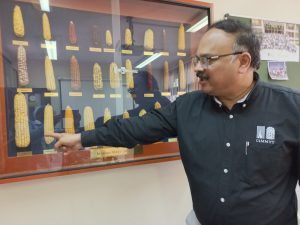African Researchers Team up to control pests – Kenya News Agency
Scientists from South Africa and the East have suggested a collaborative approach in order to manage the challenges of pests and diseases in food production.
The experts who are working on an Integrated Pest and Disease Management packages to address the recent invasion of Fall Army Worms (FAW) menace called on the need to develop and scale up proper technologies to assist farmers avert losses.
The Plant Health Initiative scientists have been researching eco-friendly pest control technology to stop the spread and spread of fall armyworm. These include combined approaches like bio pesticides, resistant varieties, biological control methods and other biological control methods that can be used.
Speaking during a workshop on maize Integrated Pest and Disease Management (IPDM), Dr. Prasanna Boddupalli, Consultative Group on International Agricultural Research (CGIAR) Plant Health Initiative Lead expressed fears that previous interventions to control the invasive pests failed to realize the desired results due to high costs and chemical involved in the exercise.
He said that the partnership was a good idea as it would combine different technologies for pest control. Farmers would have a formidable tool to achieve higher yields because of the fact that different expertise would create different components.
“Countries cannot work in isolation and there is need for partnerships to come up with different combinations of pest management control for hundreds of farmers to be able to benefit” he said.
Dr. Prasanna observed that most technologies don’t scale up as expected because most farmers communities weren’t made aware of the control concept and were not given access at the right time to the packages.
“There is still the gap of access to information when it comes to input and plant health innovation and services which are critical for scaling up technologies to the farmers especially the rural women and marginalized communities “, he said
As Director, Global Maize Program at International Maize and Wheat Improvement Center, Dr. Prassana, who is also a Research organization, said that while there is a need to develop the technology, farmer participation during testing was crucial to the success of implimentation.
“In the East and Southern African region, we are working with over 700 farmers on research stations where they test our seeds and we ensure that at least 30 percent of them are women”, he explained.
The regional workshop, Dr. Prasanna noted, was critical since partnerships was critical to identifying gaps, engaging and also understanding priorities and bottlenecks in order to come up with better solutions for developing and scaling Integrated Pest and Disease Management (IPDM) .

Godfrey Aseya, a Ugandan breeder who is also Director of Research for National Agricultural Research Organization of Uganda (NARO), stated that they are working together to identify key pest problems and develop IPDM.
He said that this was happening in the context of the efforts of each country in the region, to validate technologies for the FAW, which is a key pest in East Africa.
FAW is estimated that FAW causes between 8 and 20 millions tonnes of maize loss each year in Africa. This is because there is very little knowledge about the pest, and how to manage it.
“ we are in the process of identifying varieties that are promising and will soon be released as well as recommending some chemicals for farmers in combination such as bio pesticides and bio control “, he said
He said that combining the best pest control practices across the agroecosystem trans boundary will help them combine their experience and best practices.
“We see light at the end of the tunnel and see our work showing some promising results and scores on integrated pest management.
Aseya however noted that farmers are key components in this technology and working with them at the farmer’s field in a participatory manner so that they can see it is a win.
He added that the team had also integrated indigenous farming practices as a component of the pest management through the agro ecological management of FAW such as early planting, cultural and mechanical control, Weed manipulation and also Push Pull Technology.
According to the scientists there will be need to for more engagements by all states of where the IPDM project was rolled out to review the outcomes and policy regulations related to pest and disease management in a participatory approach.
Participants in the workshop were drawn from National Agricultural Research Institutions, Plant Protection Organizations, and International Centres from Kenya, Uganda and Zambia.
By Wangari Ndirangu
Source: kenyanews
